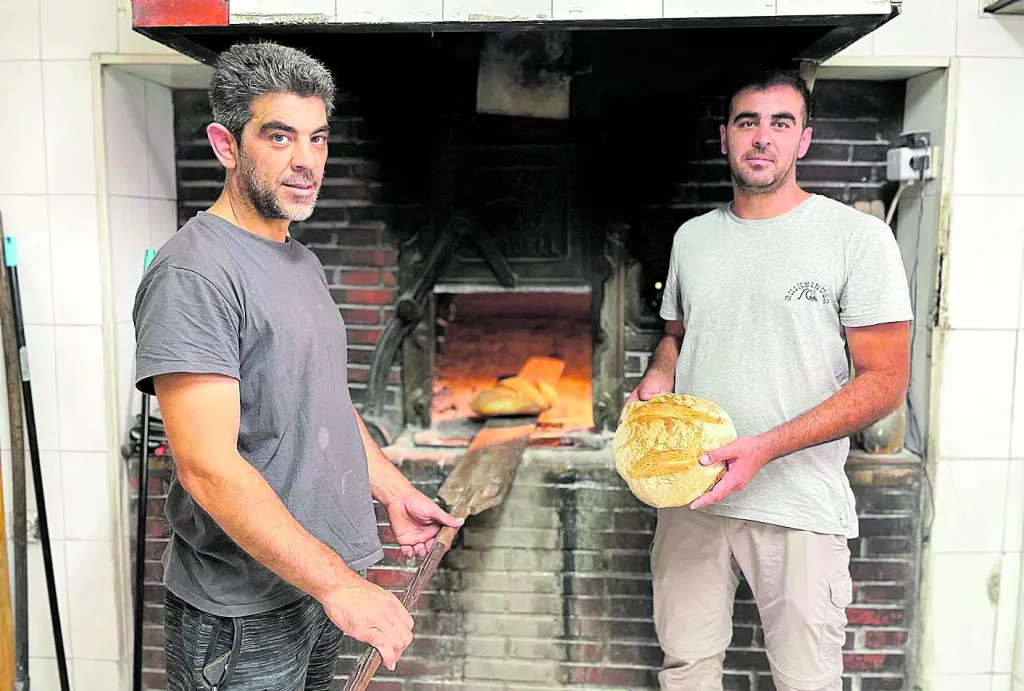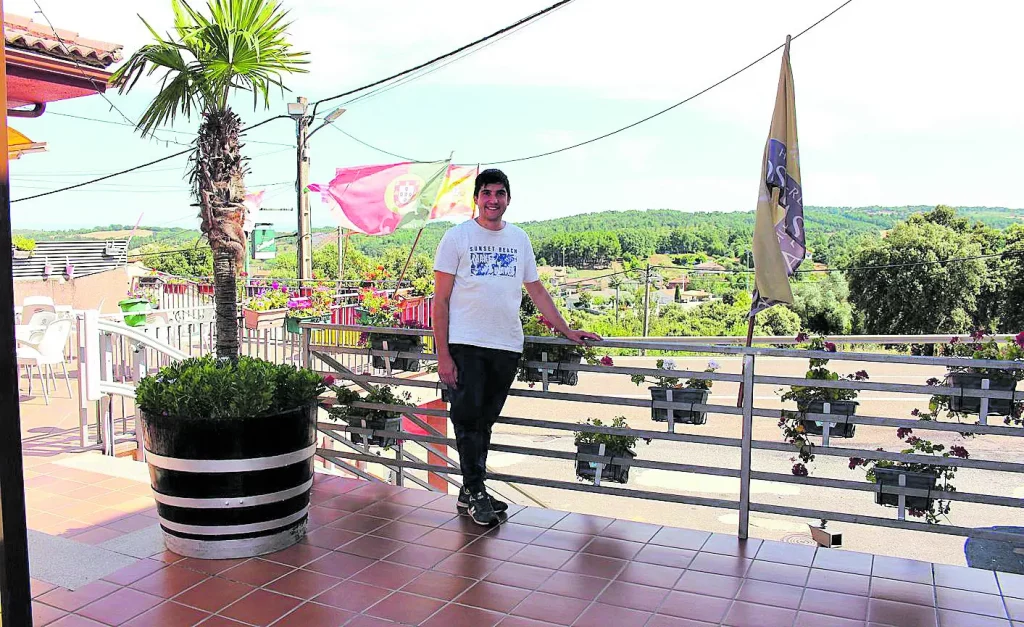The DIHSE PROJECT aims to boost entrepreneurship in the border region.
Chef Marcos Senández and bakers Ángel and Manuel Morán are committed to working and living in an area with great potential to retain population and generate employment.
DIH-SE is a Spanish-Portuguese project that began last November with a clear objective: to promote economic activity and entrepreneurship in the border region, using the Silver Economy as its main reference. For our readers to understand the context, the Silver Economy refers to an economic model that addresses services and products related to the consumption of people over 50 years old. Therefore, it encompasses a wide range of businesses and services, from healthcare and elderly care to construction, tourism, commerce, and more, highlighting the significant impact of this economy in a province already declared as a “European reference Silver territory.”
Rural youth in the border region take over traditional businesses with new ideas.
For this momentum to take place, it is essential that young people with roots in the area commit to continuing traditional businesses that hold great value for the community and build on the know-how—an intangible asset of great utility for the business world.
This is the case for chef Marco Senández, who has taken over from his grandfather at the well-established Restaurant Hostal Los Castaños in Trabazos, and bakers Ángel and Manuel Morán, the fifth generation to keep the traditional Morán Bakery in Alcañices open. They are successors but also entrepreneurs: they know the present has new demands (takeout and home delivery) and that their long-standing businesses need a digital presence with websites and social media. They also work differently: their predecessors barely rested during Christmas and New Year’s, but they now prioritize balancing personal life, health, and work, despite the typical demands of running a small business. They also combine their entrepreneurial activities with traditional farming tasks, always having a plan B in mind, because above all, they want to stay.
Marcos Senández Fernández speaks with devotion about his grandfather Juan Senández Terrón and the hostal-restaurant he created after returning from emigrating to Switzerland. It’s a business that has grown and become well-established over nearly 50 years, thriving on the characteristic hustle and bustle of a border region: their clientele includes tourists and locals enjoying their leisure time, as well as workers and truck drivers who trust this reliable stop. “I lived here with my parents, though they later bought a house, and I also lived here when I came back. I always said I wanted to take over when my grandfather retired, so I studied cooking,” explains Senández proudly of the place where he now sees his daughter running around. The young man has just completed six years at the helm of this family business, which remains so: his wife is also a cook, and his aunt runs the bar. He has worked elsewhere and received good offers, but he always imagined himself at his grandfather’s hostal-restaurant.
At Los Castaños, they still serve the famous sweetbreads with his grandfather’s sauce and boletus mushrooms with cream, traditional house specialties. They’ve also kept the meat, an excellence in the Aliste region. “Then I started adding new things. For example, a few years ago, after a vacation in Asturias, I decided to include ‘cachopo’ on the menu. I thought: if it’s good in Asturias, with the meat we have here, it must be amazing, and it has been a success. Right now, in the summer, it competes with our steaks in terms of sales,” says the chef.
When taking over a business today, there are physical renovations and also digital ones: Marcos’ grandfather used to promote the business solely with traditional brochures left at the tourism office, but now Marcos has outsourced the business’s digital communication, with a presence on social media (Facebook and Instagram), a website, and listings on industry portals like Tripadvisor. His philosophy is to honor his grandfather’s legacy with new additions that enhance and grow the business. He defends the entrepreneurial spirit his grandfather had back then. “At that time, it was a restaurant that set a benchmark in the area; he was someone who innovated when that wasn’t common,” says Senández. His desire is to stay in Trabazos no matter what. The most challenging part of settling in the village was that his wife, who is from Zamora, struggled at first, but now she has adapted well. When asked if he would like his daughter to follow in his footsteps, he acknowledges the hardships of the work: “It’s a very demanding job, and I feel it most with my daughter, especially now in August.” But he adds: “It’s tough, but I enjoy it. I like it. I wouldn’t know what else to do, and I also can’t stand being idle.”
Despite the challenges, Senández supports entrepreneurship in rural areas. “Here, everyone knows each other, and they will always lend a hand. I’ve had people from the village having a coffee here when a bus showed up unexpectedly, and these people jumped into the kitchen to make salads—you don’t see that in a city. And here, businesses are companions, not rivals, because there’s no point in being otherwise,” he says. When he thinks about initiatives to encourage more young people like him to start businesses in rural areas, he quickly mentions the demand for tax reductions. “They have to address it somehow because we are paying the same taxes as people in Madrid, Barcelona, Valladolid, or Zamora,” he argues.

Five generations and a wood-fired oven
In the same region as Senández, Aliste, other young individuals have chosen to secure the future of a business in Alcañices that is now in its fifth generation, looking for new market opportunities through a deeply traditional product: bread baked in a traditional wood-fired oven.
The Morán brothers, Ángel and Manuel, have experience in other trades, such as agriculture, which they still pursue alongside their well-known bakery, which shares their family name. Having always helped their family, when the time came to take over, they embraced this way of life, which offers them more stability than other jobs, and they know it works because it has succeeded for many years. Their decision was also influenced by the tranquility of the village and, as Ángel puts it, the importance of “doing things right.” “It’s not just about making money, as some people think these days. It’s about doing a job that’s worth it,” he says.
As artisans producing high-quality bread, they face the challenge of people not always valuing the effort involved. “There’s a trend toward artisan products, but sometimes it feels more like a fashion statement rather than genuine appreciation,” Ángel notes. The Morán brothers, the future of the renowned Morán Bakery, encourage other young people to help sustain rural life, emphasizing the importance of having basic necessities close by without needing to travel to a city. “Alcañices retains its population, but services are lacking. More initiatives are needed to encourage young people to stay,” Manuel states. Ángel adds, “It’s important for people to not only enjoy the peaceful rural life but also have economic stability. There aren’t always the jobs needed to achieve that here.”
The bakery supplies 17 villages in Aliste and, under the brothers’ management, has embraced social media and a digital presence. Still, it thrives largely due to its long-standing reputation. “People come for Morán’s bread and the typical bolla with chorizo,” Manuel explains. Unlike their predecessors, the brothers take breaks together, ensuring neither bears the burden of work alone. Another change in the bakery is the introduction of pizzas, baked in the traditional wood-fired oven, just like the bread. “We try to find market niches. People gather with friends, and it’s a product they enjoy. We also make empanadas and smaller items if customers need them,” says Ángel.
Like Senández, the Morán brothers are open to the modern changes needed to ensure their family businesses in the border region can survive, grow, and contribute to the dynamism of a zone with great future potential.

(Published in La Opinión de Zamora on August 25, 2024)




